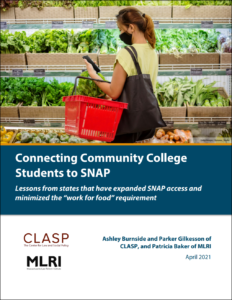New Report Recommends Pathways to Reduce Food Insecurity Among Community College Students
 Food insecurity is on the rise throughout the country, including for low-income college students struggling to complete their education. COVID has further exacerbated the crisis for students. In a national survey conducted in the fall of 2020, roughly three in five college students reported they are experiencing basic needs insecurity during the public health crisis.
Food insecurity is on the rise throughout the country, including for low-income college students struggling to complete their education. COVID has further exacerbated the crisis for students. In a national survey conducted in the fall of 2020, roughly three in five college students reported they are experiencing basic needs insecurity during the public health crisis.
College students have been left with unique and complicated challenges as a result of the pandemic. At the colleges that previously offered campus-based food pantries, donated “meal swipes” from paid meal plans, or subsidized cafeteria meals, remote learning has caused these options to mostly disappear — and for many students, even these gestures were not enough. Community college students — a group often including more first-generation college students from families with low income — have been especially impacted without the campus and community networks that provided them with resources prior to the public health crisis.
Yet policy barriers in the Supplemental Nutrition Assistance Program (SNAP), including student work requirements known as “work for food” rules, perpetuate this threat to student learning, health, and stability.
Although Congress authorized states to implement temporary measures to provide federal nutrition benefits or SNAP to more college students during the pandemic, these measures will likely expire by end of this calendar year. But Massachusetts has demonstrated a solution that other states could emulate to more permanently expand access to SNAP benefits for low-income community college students.
In 2010, Massachusetts activated a state option to qualify as SNAP-eligible community college students who were in a certificate or associate’s degree course of study likely to lead to employment. The Massachusetts SNAP state agency adopted this policy change after MLRI convinced the state that federal law gave states the discretion to define which state- and locally-operated programs for low-income households would qualify. Since this successful implementation, Pennsylvania and a few other states have followed Massachusetts footsteps by taking advantage of this provision and exercising the discretion afforded by the federal regulations.
MLRI and the Center for Law and Social Policy (CLASP) co-drafted and recently released a report, Connecting Community College Students to SNAP, describing the policies for community college students in use in Massachusetts and Pennsylvania. The report provides a detailed legislative history of this effort, as well as recommendations for how state policymakers, education agencies, college administrators, and advocates around the country can reduce food insecurity among college students with low incomes by expanding their access to SNAP.
MLRI is now guiding several states on how they too can expand critical SNAP benefits to college students in their states, and will continue to advocate for federal policymakers to permanently remove barriers standing in the way of nutrition assistance for college students.
